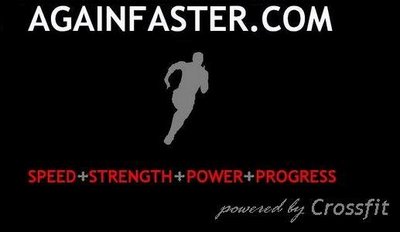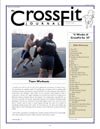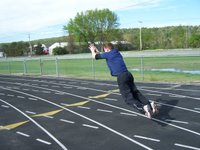
Thinking about Performing
If you train hard, you should think hard. Getting out there and busting your hump is the first step, but it isn't enough to become a great athlete. If you want to be great, I believe you need to think about what you're doing and why you're doing it.
The "why" is the easy part: I work out to live longer, to look better, and to have the wherewithal to win any competition I enter. Maybe not in that order.
I train so I can train harder, faster, and longer. Ask any schmuck at the gym why he/she/it trains, and they'll give you some variation of the "sports and sex" explanation. They want to beat someone at something or look better naked. Ask them what they do to train, and you'll probably get a blank stare followed by a detailed explanation of the last issue of Men's Health or Self Magazine.
You're getting blank stares because the "what" is the hard part. I know what I do athletically--Crossfit, Olympic lifting, speed work, and the occassional competition. Is it the best thing to do? Who knows. It's done a hell of a lot for me, but I'm sure it can be improved upon. There is a dedicated group of professionals in the Crossfit community improving the programming right now. They're thinking about the what and why.
I don't have enough experience with Crossfit to question the cult. The stuff works. What I can question and control is how I implement the program. What days do I workout? Does 3 on, 1 off work for me? What about 2 on, 1 off? Should I be doing a WOD every day, or does Coach Rutman's Black Box program get me closer to my goals? Is the real secret to happiness a steady dose of Tae Bo? I don't have the answer to these questions, but I'm working on it. My answer and your answer aren't going to be the same.
I keep a log in order to help me understand exactly what I'm doing. You can't improve your program if you don't know what your program involves. I'm thinking about what I'm doing.
I recently recognized that my log was nothing more than rounds, reps, loads, and times. Standard Crossfit recordkeeping. It was a handy system--if I'm doing 5 x 5 front squats, I can look at the last time I did them and compare. It just isn't enough.
I'm a quantitative guy. I like data. I like looking for patterns in numbers. Towards that end, I've implemented a system that allows me to quantify the more intangible aspects of training. How do I feel? How hard is this workout? How hard did I work? How long have I had to recover?
Quantifying feelings is a tricky business. The answer to this problem comes from the social sciences. Researchers use something called the Likert scale on a regular basis when conducting surveys. The Likert scale assigns a number value to a subjective rating, and asks the respondent to indicate which number most closely corresponds to their behavior/thoughts.
Example:
Please indicate your adherence to the Zone Diet (1-5):
1 (Whadda ya mean Mountain Dew ain't Zone Friendly?) - 5 (Sorry, that chicken will put me over my allocated blocks for the next 6.4 hours)
I implement it like this:
Recovery rating 1 (absolutely fresh) - 5 (ready to die)
Workout rating 1 (that was a workout?) - 5 (the hardest thing ever)
Effort rating 1 (walked through it) - 5 (full focus and intensity)
I also include the number of hours since my last workout. An annotated entry looks like this:
R2W3E3T24. That corresponds to a recovery rating of 2 (relatively fresh), a workout rating of 3 (hard), an effort rating of 3 (got through it), and a time of 24 hours since the last workout.
These ratings, accumulated for each workout over time, should allow me to pick apart what kinds of workouts require what amount of recovery and what type of workout will allow me to maximize my intensity on a given day.
By keeping track of the hours since the last workout, you'll be able to maximize training density. If you have a recovery rating of 1 after 48 hours of rest following a max effort day and a recovery rating of 1 only 24 hours following the same workout on another day, you know you can probably cut down your rest periods. You'll be able to workout again sooner, allowing you to get stronger faster.
Thinking about training will make you a better athlete. After you've managed to get the basics right, refining your program, your nutrition, and your supplementation should be the next step. Quantifying these things with hard numbers will give you insight that a quick note probably won't.
Now quit thinking about training and go do something.




















0 Comments:
Post a Comment
<< Home